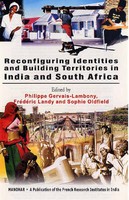Questions of territory, space and identity are critically important in the international geopolitical context as well as central to contemporary research in the social sciences. Processes connected with globalization have reconfigured identities and territories at multiple scales, connecting and disconnecting places in complex ways and re-enforcing old while producing news forms of segregation and polarization. Global processes meet the complex and the locally specific South African and Indian geographies of inequality, espressed at national, regional and local scale. In the South African case, a political imperative to transform the legacies of racial inequality from colonial and apartheid rule underscores the centrality of racial identities. However, racial discourse and differentiation embodies and at times masks a complex mix of place-based, gender, class and cultural identities, expressed in a multi-scalar politics of territory. More than 50 years into independent rule, Indian identity politics continues to build to a large extent on caste and the intricate ways in which caste-affiliation merges with religious, socio-economic, political and place-based identities. In both contexts, the politics of identity and territory simultaneously unify and divide.The spaces, territories and identities (re)produced in the complex contexts in which the global, national, regional and local meet lie at the heart of the research from which the papers in this book have been generated. The research investigated the reconfiguration of Indian and South African identities and territories through dialogue primarily between geographers, but also other social scientists, from India, South Africa and France.

